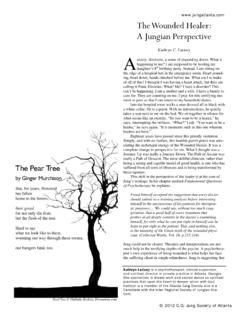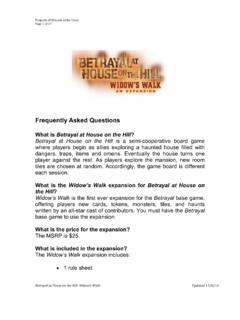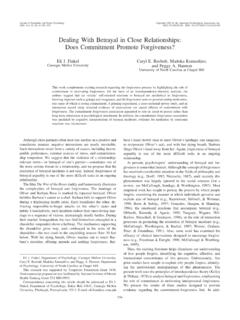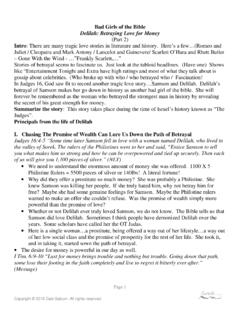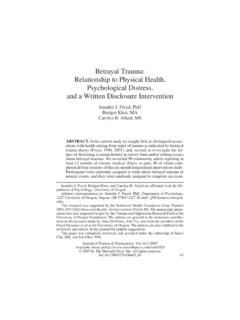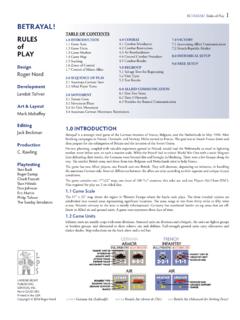Transcription of Trust and Betrayal in Love - Jung Society of Atlanta
1 6 Jung Society of Atlanta love is the dynamism that most infallibly brings the unconscious to light Jung T he topic of this article originates from a question that was asked after my June lecture on love as an Agent of Change. Referring to the part of the Eros and Psyche story where the lovers come together in the magical palace and Eros forbids Psyche to see him or speak of him, the questioner asked Why does the god Eros not want to be seen? As I tried to answer the question, I found myself wandering farther and farther away from any meaningful answer, as though I, myself, was not supposed to *see* or *know*.
2 The night after the lecture, I was aware when I awoke several times in the middle of the night that my mind was really working with the question. What did I not want to see? What could I not see? The myth of Eros and Psyche is a story of an awakening soul, yet the god is asking not to be seen or spoken of. On the surface, the purpose seems designed to perpetuate the idyllic, magical state between the lovers. And we know from the story that when the god is eventually exposed, he vanishes. How are we to understand this? Is Eros deceiving Psyche? Is it a big set-up? Is the god s entreaty a call to remain ignorant of the fullness of love ?
3 I am reminded immediately that sweet deceptions are the leitmotive of love and that the paradoxes of love are always pulling us in different directions, often at the same time. Also that this contradictory and paradoxical nature is the most strik-ing feature of Eros. His charmed bow is armed with twin arrows, one aimed at happiness, the other at life s confusions. Many people who have written about the myth interpret the taboo as a warning of the greater mystery that cannot yet be contained by an immature psyche. We find the theme in many myths and fairy tales. Infringement of the taboo usually turns out to be an initiating event and a move into a fuller conscious-ness, even though it is initially experienced as a loss or a be-trayal.
4 Psyche comes to know Eros in the dark, which suggests a kind of blindness or unconsciousness. We are told that it is a time of bliss and great joy. We can all relate this part of the story to those times when we have fallen in love and experi-enced that state of euphoria, when we give ourselves in com-plete Trust to another. On an external level, we can experience this state with a person, with a job or organization, or with a new way of life. On an internal level, it represents the hidden regions of our soul, the place of imagination and creativity. This time of magical thinking is vital to our psychic life.
5 It often has no language and cannot be talked about. And in fact, often should not be talked about. Consider, for example, the importance of the incubation of a tender, unformed thought or intuition in a creative project. How often has that infant idea been crushed by talking about it before it matures? Or how often has an intuitive insight dissolved when exposed too soon to a logical examination? Or how often has the creativity of an inner drama been aborted if talked about too soon? And what could possibly be more painful than having one s image of a new lover and the accompanying fantasies dissected before it is time?
6 S ome things need to be held in the dark for a while before being exposed to the light. A personal experi-ence taught me the importance of this fact. While I was in Zurich, I had a dream that consisted of a single sym-bol. It was a numinous experience and held a lot of energy. When I shared it with my analyst, he simply asked me ques-tions to deepen the experience. I walked away with such gratitude that he simply honored the dream and did not try to analyze it or examine it too closely. In this way, I was able to hold on to the power and energy of the symbol that emanated from that deep layer of my unconscious.
7 This is the great mystery of creation. Under the cover of darkness, the erotic quickening that is so necessary to the creative process takes place. In this space, masculine and feminine energies come together and ideas form, separate and exist in a timeless, effortless flow. James Hillman, in his book The Myth of Analysis writes about the twin aspects of Eros, the inhibiting and the driving force. The inhibiting force, he says, delays, heightens ten-sion and expands imaginative indirect move-ment is not a pattern of flight, though it may be intertwined with the reflective.
8 It is not, essentially, a bending-back or a turning-away from the object; it is rather a continued advance upon it, but indirectly, and with a different This inhibiting component holds back life and leads into the invisible realms below and beyond mere life, endowing it with the meaning of the soul given by death. But there is a time to bring things into the light and the driving force of Eros pushes us to reach for the lamp. What emerges from our depths has to be translated into everyday language and experience. The taboo that Eros imposes on Psyche implies and requires the transgression.
9 Psyche must break the taboo, just as Eve must eat the apple from the tree in the Garden of Eden, or as the innocent girl must open the door in Bluebeard s castle. If Psyche says yes to Eros demand forever, or buys into the secrecy pact, she closes the door to further reflection and consciousness. Her disobedience and Betrayal of the pact, which seems self-destructive at first, has a prospective function for individuation. Trust and Betrayal in love Jacqueline Wright, Jacqueline Wright, is a Jungian analyst in private practice in Atlanta . She also lectures and conducts workshops on topics re-lated to the psychology of Jung.
10 She is a graduate of the Jung Institute in Zurich, past President of the Georgia Association of Jungian Analysts and a training analyst in the Inter-Regional Society of Jungian Analysts. 2006 Jung Society of Atlanta Summer 2006 7 I m reminded of those times when we look the other way because we don t want to see something. If we dare to look, we are forced to confront an other, be it an-other opinion, an-other who is different from us, an-other side of ourselves. Then we must bear the tension created by the opposites. Al-though the interaction between the opposites may torment one, it provides the secret energy source of life.

